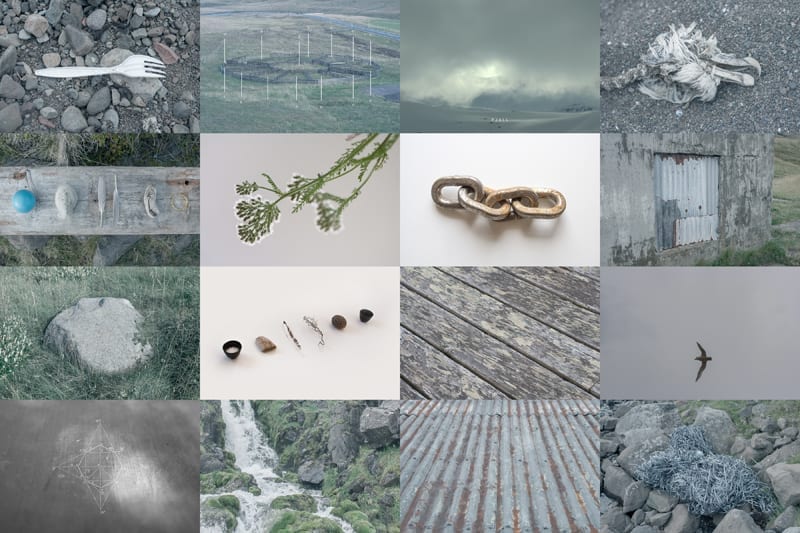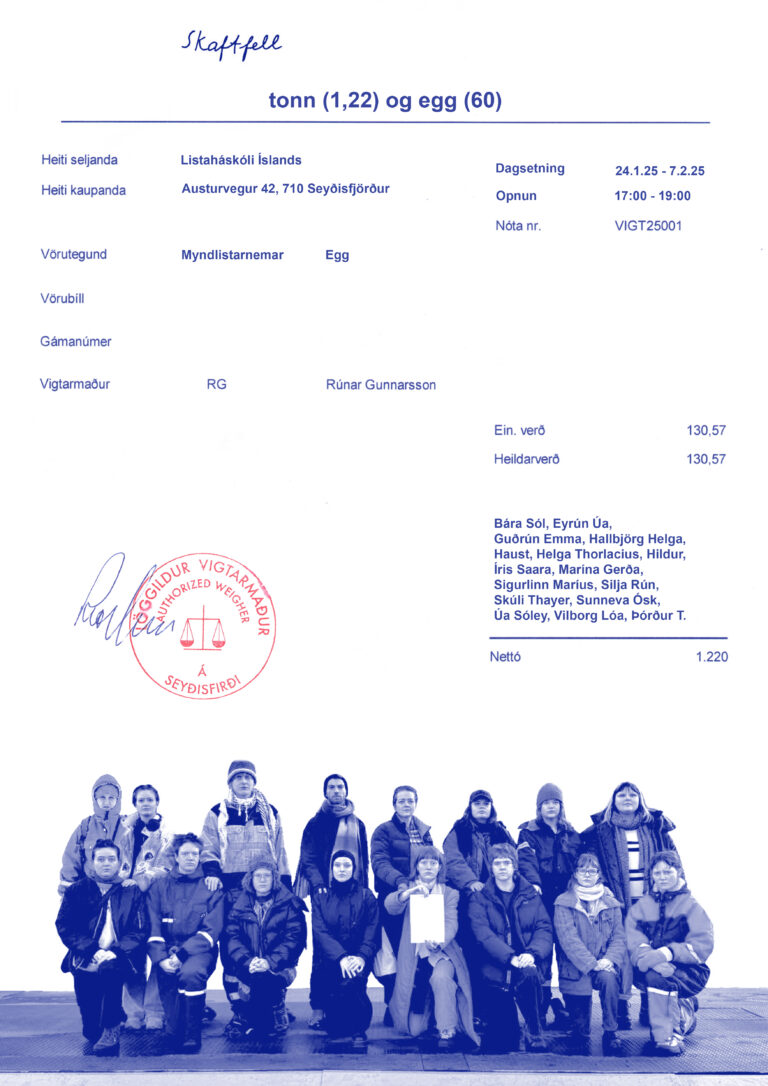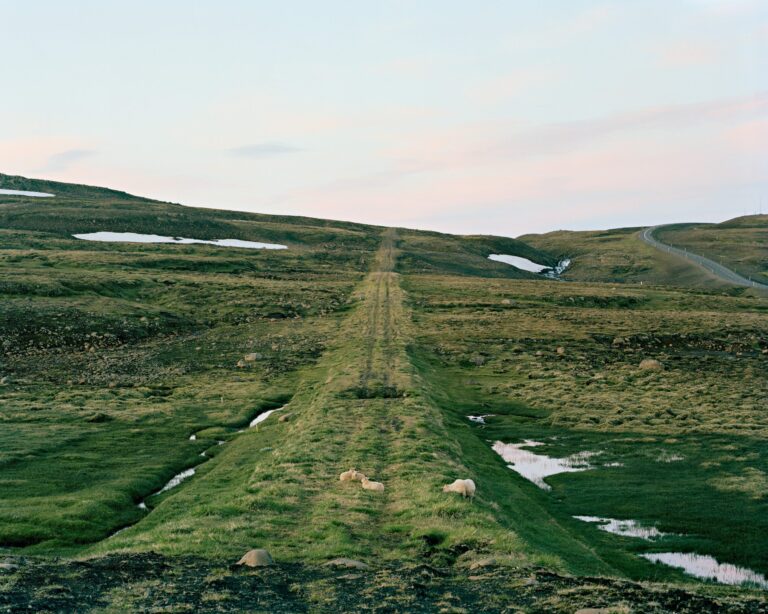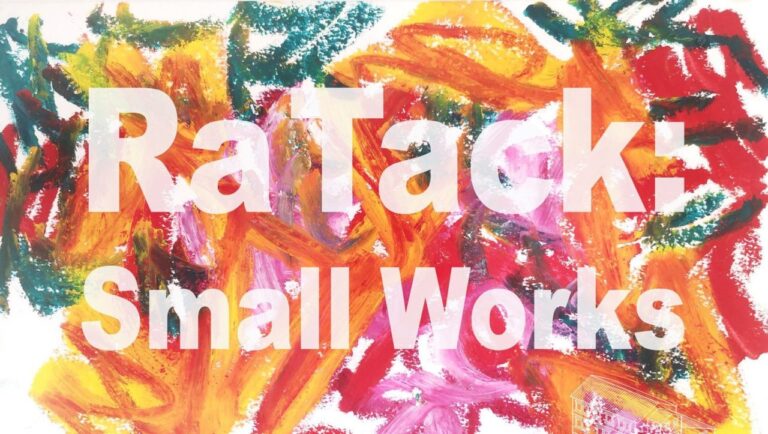Skaftfell is hosting a three day symposium and dialogue platform focusing on the intersection of visual art and ecological issues in Iceland as a part of the project Frontiers in Retreat. We will ask:
- What are the particularities of ecosystems, environment, community, and daily life in Iceland?
- How do artists engage with these issues and what is their contribution to this discourse?
- What opportunities and challenges are in store for local ecologies and how can we adjust to them?
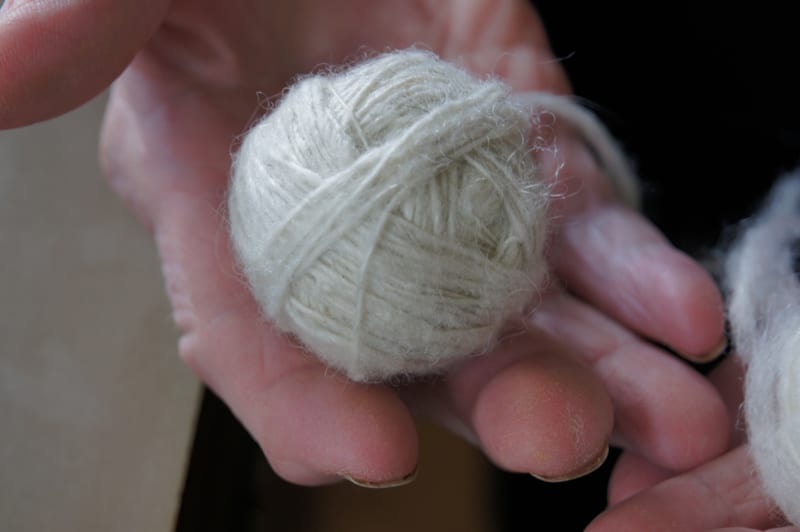
The symposium will offer lectures on nature, geography and human existence, the interplay of visual art and ecology, environmental issues and conscious lifestyle, improvements of the communal infrastructure, and increasing the quality of life. Special guest speaker and closing the symposium on Sunday is Naresh Giangrande from the British Transition Network, a charity that inspires, explains, broadens, supports, trains, and deepens world wide engagement in and awareness of the Transition model, whose activities strive for developing a low carbon high well-being world.
Other speakers are:
Caitlin Wilson (IS), Landvernd Icelandic Environment Association
Erla Dóra Vogler (IS), Djúpavogshreppur
Guðfinnur Jakobsson (IS), Skaftholt bio farm in South Iceland
Hjalti Jóhannesson (IS), University of Akureyri Research Centre
Jonatan Spejlborg and Lasse Hogenhof (DK), Lunga School
Kati Gausmann (DE), visual artist
Martin Gasser (CH), Breiðdalssetur
Ósk Vilhjálmsdóttir (IS), visual artist
Ráðhildur Ingadóttir (IS), visual artist
Rán Þórarinsdóttir (IS), East Iceland Nature Research Centre
Richard Skelton (UK), visual artist
The symposium will take place in English in Herðubreið Community Center and entry is free. Please register at fraedsla@archive.skaftfell.is
The program is available to download here

Information about the speakers
Caitlin Wilson works for the Icelandic Environment Association Landvernd. She holds a B.A. in English from the College of William and Mary in Virginia (USA), and an M.Sc. in Environment and Natural Resources from the University of Iceland. She has been living in Iceland since 2006 and is currently working on her doctoral project on sustainability education at the School of Education, University of Iceland. Caitlin has worked as a director of study for many university groups visiting Iceland from abroad, and currently holds a position as adjunct teacher at the School of Education, University of Iceland, in the field of sustainability and environmental education. At Landvernd she focuses on developing the association’s Green Flag/Eco-Schools program, which aims to introduce more complex themes into environmental education in schools, such as climate change and biodiversity.
Erla Dóra Vogler grew up in Egilsstaðir, East Iceland. She studied at the college in Egilsstaðir and graduated in 2003 from the natural science course. She graduated with a BSc in geology from the University of Iceland and the 8th level certificate in classical singing from the Music school in Reykjavík in the spring of 2007. In the autumn of 2007 she started her studies in the opera course at the University of Music and Performing Arts in Vienna. Erla moved back to Iceland in 2010 and graduated with an MSc in geology in 2014. Erla has worked for the Municipality of Djúpivogur since February 2015 as the Tourism and culture officer and program manager of Cittaslow. She performs as a singer on a regular basis and has been the chairman of the Nature Conservation Organisation of East Iceland (Náttúruverndarsamtök Austurlands – NAUST) since the end of 2015.
Guðfinnur Jakobsson, b. 1943, grew up in Jökulfjörður in the Westfjords of Iceland. Guðfinnur was introduced to organic farming at an early age when working in forestry with Martinus Simson. He graduated as a pilot in Reykjavík but never worked in the field due to the economic recession. After working in several jobs he turned his focus to his main interest, organic farming. Alongside studying in the National Gardening School of Iceland he also worked as a gardener for eight years. After graduation he continued studying in Sweden and worked in a home for the disabled and became acquainted with curative education. In 1980, he co-founded the organic farm Skaftholt in Gnúpverjahreppur. The initiative was a pioneer project in Iceland and the transformation process took years, since the main principles of organic farming had to be adapted to the Icelandic environment. The aim of the initiative was to build a small sustainable community where everyone could be active and participate, disabled or not. This goal has been achieved but is constant in development.
Hjalti Jóhannesson is a researcher at RHA – University of Akureyri Research Centre. His work focuses on regional development in the broader sense. Among his research projects has been an extensive study, commissioned by the Icelandic government, on the social and economic impacts of megaprojects in East Iceland during the period 2004-2009. During this very turbulent period in Icelandic history Jóhannesson and his fellow researchers at the RHA directed their main focus on East Iceland, looking at the regional effects of the construction of an aluminium factory and a large-scale hydroelectric project. Although this project has been completed many years ago, Hjalti is still very interested in observing how the region is developing. At the symposium he will present some findings on demographic conditions in East Iceland.
Jonatan Spejlborg and Lasse Høgenhof are co-founders and headmasters of the LungA school, est 2013 in Seyðisfjörður. It is a small experimental art school with students from all over the world, and similarly, artists from around the world coming to lecture and facilitate workshops. The school is an adventure into a collective learning experience – a commune of students dedicated to learn from and with each other while living together on in a small town on the east coast of Iceland. It is an experimental ground for creativity, art and aesthetics. An art school for the curious mind, for the untamed, for the explorers. In the talk we look at the school as a place for conscious cultural creation and the sociocultural impact of allowing the borders of a school to be membranes that recognize their interdependent relationship with the surrounding cultural and natural environment, and we will introduce what we consider to be some of the key aspects of how these schools can be created and flourish.
Kati Gausmann is a sculptor living and working in Berlin. Her work is concerned with movement, rhythm, and action as form-generating processes. In her artistic practice she combines the exploration of different materials and their qualities with acts of drawing, installation, and performance. Artistic expeditions and theoretical investigations are an important part of her working methodology. With the artist group msk7 and as a solo artist Kati has exhibited widely in Germany, as well as at Gallery Kling og Bang, Reykjavík. http://www.kati-gausmann.de/en/ & https://katigausmann.wordpress.com
Martin Gasser grew up in the Swiss Alps. Martin has been committed to volcanoes since 1980, since he was just five years old and the eruption of Mt. St. Helens took place. Since 1995 Gasser has been active in cave surveying in many parts of the world. He holds a M.Sc. in glacial geology from the University of Bern, and has done extensive studies on the volcanoe Citlaltepetl in Mexico. Martin has been living in Iceland since 2006. From 2012 he has worked as a curator at the Research and Heritage Center Breiðdalssetur in Breiðdalsvík, East Iceland.
Naresh Giangrande is a co-founder of Transition Town Totnes, the first Transition Town in the UK and worldwide. Naresh has been involved in designing, running and evolving many of the events, groups, and trainings that have been at the heart of the enormously successful Transition Towns project. He has delivered the Training for Transition, Transition Talk Training, Train the Trainers, and Transition training for Local Authorities and organisations to hundreds of participants in 9 countries. He has given dozens of lectures and interviews, and has spoken at many conferences and other public events.
Before the Transition Town Initiative took over his life he lived and worked in an eco community, was managing director of a landscape company, and a gaffer in the film industry. He has also taught meditation, has a degree in chemistry from the University of Pennsylvania, and is father to two lovely daughters. He lives in the UK.
In his talk Naresh Giangrande will present his vision of the Transition to a sustainable world. Title: Being local in a global world: the Transition to a low carbon high well being society. Living closer to the land on which we stand, and depending on each other, we can start to make a world that will be one worth fighting for. It will be a more local world, and one where we are dependent on our local resources for the things we need to live well. But this is not a given. There are many ways in which we go, and in fact are going today, and which one becomes the dominant cultural story remains to be seen. Transition towns, from its inception in a small market town in South West England in 2006 to the global network of Transition towns we have today, all live the transition to a more local, high well being lifestyle.
People in Transition typically ask three questions:
- What is my ideal, my dream for the place i am living in?
- What would be needed to get us to that dream?
- What can we start to build now to get us there?
Transition Network is the charity that inspires, explains, broadens, supports, trains, and deepens world wide awareness of and activity in the Transition model to a low carbon high well being world.
Ósk Vilhjálmsdóttir studied at the Icelandic Academy of Art and Crafts and at Hochschule der Künste in Berlin. Her work stems from her sense of political commitment, often addressing tension between the public and the private and investigating the potential that art holds as a mechanism for dialogue and social change. Seeking to critically challenge consumerism, globalization, the exploitation of the environment, and the needs of individuals to navigate an increasingly complex daily existence, Ósk’s exhibitions – which include photography, video and installations – are often made in cooperation with the public, such as her series of works made with children and teenagers.
Ráðhildur Ingadóttir was born in Reykjavík, Iceland. She studied art in England from 1980 to 86, and has been active as an artist since then. Ingadóttir’s approach includes text, drawings, wall paintings, sculptures and videos and often these elements are incorporated into expansive installations. She has through the years exhibited extensively in Europe. Ingadóttir was a visiting lecturer at the Iceland Academy of the Arts from 1992-2002. She has also been visiting lecturer at the Royal Danish Academy of Fine Arts. She was on the board of the Living Art Museum in Reykjavik for some years, and curated and co-curated exhibitions there as well as elsewhere. From 2012 to 2014 she acted as an honorary artistic director at Skaftfell Center for Visual Art in Seyðisfjörður, Iceland. Ingadóttir has received art awards and travelling grants both in Iceland and Denmark. She now lives and works in Reykjavík and Copenhagen.
Rán Þórarinsdóttir, Ms biologist from the University of Iceland. Working for East Iceland Nature Research Centre since 2004. Main projects: Monitoring the calving area of the Snæfell reindeer herd since 2005, assisting with annual reindeer counts and quota settings, giving lectures on reindeer and sometimes on other ecological subjects for schools or other interested groups. In her talk she will focus on imported reindeer in a sensitive ecosystem.
Richard Skelton is an artist from northern England, UK. His work is informed by landscape, evolving from sustained immersion in specific environments and deep, wide-ranging research incorporating toponymy and language, ecology and geology, folklore and myth. Over the past 10 years he has worked with texts, artist’s books, films and music, but more recently he has become interested in using curation as a means of exploring counter-historical narratives. Alongside running Corbel Stone Press with the Canadian poet Autumn Richardson, he is ‘founding member’ of the Notional Research Group for Cultural Artefacts and the Centre for Alterity Studies. www.corbelstonepress.com , www.nrgca.wordpress.com, www.alteritystudies.org
The symposium is held with the support of the Culture Programme of the European Union, The Icelandic Visual Art Fund, The East Iceland Regional Development Fund, Seyðisfjörður Municipality and the Nature Preserve Fund of Pálmi Jónsson.
![]()
Photos: Richard Skelton and Kati Gausmann
About the Frontiers in Retreat:
Frontiers in Retreat is a five-year collaboration project that fosters multidisciplinary dialogue on ecological questions within a European network formed around artist residencies. The project sets out to examine processes of change in particular, sensitive ecological contexts within Europe, to reflect them in relation to each other and to develop new approaches to the urgencies posed by them. Moreover, the project recognises the necessity of multidisciplinary approaches to the current ecological concerns and aims to develop means and platforms for this through methods of contemporary art.
The project is coordinated by HIAP – Helsinki International Artist Programme with the support of the Culture Programme of the European Union. The project connects artist residency centers located in “remote” areas across Europe in order to provide a unique, transnational platform for investigating local and global ecological concerns. Frontiers in Retreat is realised by seven artist residency organisations in Finland, Iceland, Scotland, Latvia, Serbia, and Spain in collaboration with a Lithuanian art organisation that will develop the educational program of the project.
The core of the project is formed by research and production residencies. 25 European artists representing different cultures, generations and artistic approaches have been selected collaboratively by the project partners to develop new art works in response to the different ecological contexts of each residency site. During the coming years, the artists will circulate within the residency network and conduct artistic research driven by the particular ecologies of the sites.

